牛津英语上海版六年级下册6B Module 1 Unit 4 Staying healthy 4课时教案附反思
Unit4单元知识结构图牛津上海版六年级英语下册
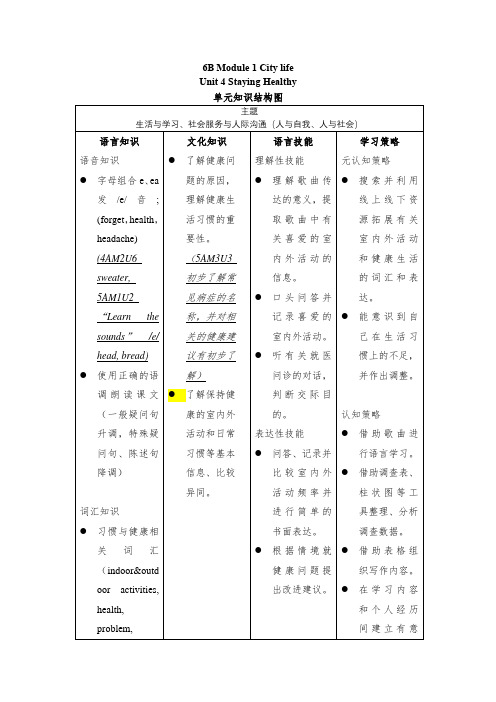
6B Module 1 City life Unit 4 Staying Healthy 单元知识结构图
本单元中,学生将围绕运动与健康这一主题,在阅读与听写活动中获取
室内外活动、健康问题和日常习惯等信息;了解就医问诊的方法,分析可能导致健康,做出改变,提升健康生活意识。
在歌曲学唱中,了解常见室内外活动,认识劳逸结合的健康生活方式;在谈论最喜爱的室内外活动中理解个人喜好的差异,了解调查图表的特点与作用;在Joe和kitty与医生进行有关健康问题的对话中,了解常见健康问题、成因及改善建议;在写作活动中,通过记录日常活动习惯,了解习惯与健康的关联,提升健康意识。
牛津英语上海版六年级下册6B Module 1 Unit 4 Staying healthy 4课时教案附反思
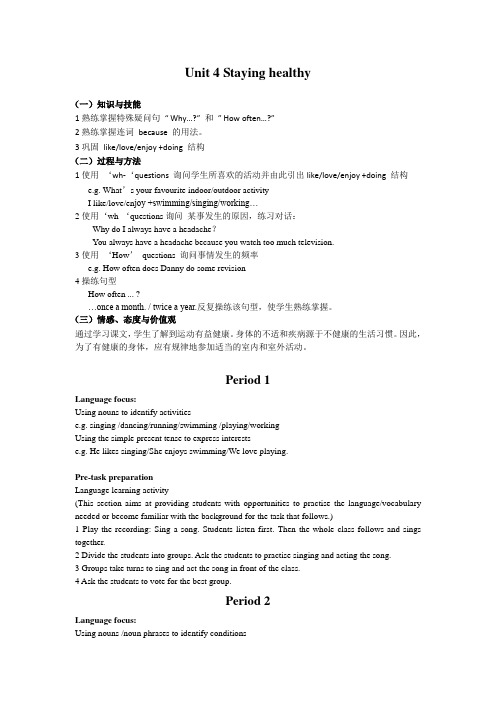
Unit 4 Staying healthy(一)知识与技能1熟练掌握特殊疑问句“ Why…?” 和” How often…?”2熟练掌握连词because 的用法。
3巩固like/love/enjoy +doing 结构(二)过程与方法1使用‘wh-‘questions 询问学生所喜欢的活动并由此引出like/love/enjoy +doing 结构e.g. What’s your favourite indoor/outdoor activityI like/love/en joy +swimming/singing/working…2使用‘wh-‘questions询问某事发生的原因,练习对话:Why do I always have a headache?You always have a headache because you watch too much television.3使用‘How’questions 询问事情发生的频率e.g. How often does Danny do some revision4操练句型How often ... ?…once a month. / twice a year.反复操练该句型,使学生熟练掌握。
(三)情感、态度与价值观通过学习课文,学生了解到运动有益健康。
身体的不适和疾病源于不健康的生活习惯。
因此,为了有健康的身体,应有规律地参加适当的室内和室外活动。
Period 1Language focus:Using nouns to identify activitiese.g. singing /dancing/running/swimming /playing/workingUsing the simple present tense to express interestse.g. He likes singing/She enjoys swimming/We love playing.Pre-task preparationLanguage learning activity(This section aims at providing students with opportunities to practise the language/vocabulary needed or become familiar with the background for the task that follows.)1 Play the recording: Sing a song. Students listen first. Then the whole class follows and sings together.2 Divide the students into groups. Ask the students to practise singing and acting the song.3 Groups take turns to sing and act the song in front of the class.4 Ask the students to vote for the best group.Period 2Language focus:Using nouns /noun phrases to identify conditionse.g. a headache/a stomach-ache/toothache/a cold/a fever/a sore throatAsking ‘wh-‘questions to find out the reasone.g. Why do I always have a headacheUsing connectives to give reasonse.g. You always have a headache because you watch too much television.Using adverbs to express degreee.g. too much/too manyPre-task preparation1 Introduce new vocabulary items: a headache, a stomach-ache, toothache, a cold, a fever, a sore throat. Encourage students to use facial expressions and body language to help convey the meanings.2 Play the recording: Look and learn and Think and say. Students listen and follow in their books.3 Play the recording again. Students listen and repeat.4 Invite students to talk about their experience of suffering from a headache, a stomach-ache, toothache, a cold, a fever or a sore throat.While-task procedure1 Students work in groups of five Distribute a copy of photocopiable page 9 to each group. Four members in the group pretend to feel unwell and one member pretends to be Doctor Chen. Ask students to follow the modeled dialogue and work together to complete the dialogue in the other pictures. Tell them to think about different reasons for not feeling well. Then students practise the dialogue in groups.2 Groups take turns to role-play the dialogue in class. Encourage students to use facial expressions and body language and be as dramatic as possible. Write all the reasons for not feeling well on the board to get students familiar with the target language. Finally, vote for the best group.3 Still in groups, ask students to draw and write down different ways for keeping themselves healthy. Collect students’work and put it on the display board.Post-task activityWorkbook page 7ConsolidationGrammar Practice Book 7A page 12Period 3Language focus:Using adjectives to describe activitiese.g. indoor activities/outdoor activitiesUsing nouns to identify activitiese.g. fishing /cycling/swimmingUsing ‘wh-‘questions to find out various kinds of specific information about a persone.g. What’s your favourite indoor/outdoor activityAsking ‘How’questions to find out quantitye.g. How many of my classmates like watching television bestUsing the simple present tense to express opinionse.g….students like …best.Pre-task preparation1 Differentiate between indoor activities and outdoor activities. Write indoor activities and outdoor activities on the board. Read them aloud. Invite the whole class to repeat the words after you. Explain briefly that indoor activities are activities carried on inside a building and outdoor activities are activities carried on outside a building.2 Invite a student to read the list of indoor and outdoor activities in Read and match aloud. Ask a few more able students to think of more indoor and outdoor activities.3 Give students some time to complete Read and match. Check answers orally.4 Students work in pairs to practise the target language in A survey .Invite some pairs of students to role-play the dialogue in class.While-task procedure1 Students work in groups. Distribute a copy of photocopiable page 10 to each group. Ask students to carry out the survey using the target language. Each group completes one survey form. Write down the other groups’findings on the survey form as well. Each group completes a simple report.2 Invite representatives from the groups to come out to the front and read their reports aloud .Collect students’work and put it on the display board.3 Make sure students know how to tead and draw bar chart .4 Students work in groups. Distribute a copy of photocopiable page 11 to each group. Ask students to carry out the survey using the target language. Each group completes one survey form. Write down the other groups’findings on the survey form as well. Each group completes a simple report and draws a bar chart.5 Invite representatives from the groups to come forward and read their reports aloud. Collect students’work and put it on the display board.ConsolidationGrammar Practice Book 7A page 13Period 4Language focus:Asking ‘How’questions to find out frequencye.g. How often does Danny do some revisionUsing the simple present tense to describe habitual actionse.g. He does some revision once a month.Using adverbs to express frequencye.g. once a month/ twice a yearPre-task preparation1 Remind students about the concept of ‘work and play’and review the song on page 14 again2 Invite a more able student to come out to the front and read Danny’s timetable. Other students keep their books closed and listen carefully3 Ask students some questions to check their understanding. Ask: How often does Danny do some revision How often does Danny watch television How often does Danny practise swimming How often does Danny help do the housework to elicit: He does some revision once a month. He watches television three times a day. He practices swimming twice a year. He never helps do the housework.4 Ask students to give their opinion about Danny’s timetable. Write the list of opinions on the board. In conclusion, students should understand that Danny’s timetable is not very good.While-task procedure1 Ask each student to think of and write a good timetable for himself/herself.3 When the students have finished, ask them to work in pairs and compare their timetables with their classmates’timetables by using the target language. One student starts the conversation by asking: How often do you…They take turns to ask and answer questions about the timetables.ConsolidationGrammar Practice Book 7A pages 14 and 16Photocopiable pages 12, 13, 14 and 15NOTES: (单元教后记)1、通过学习本单元课文,学生了解到运动有益健康。
Module1Unit4Stayinghealthy2_20120308103911531
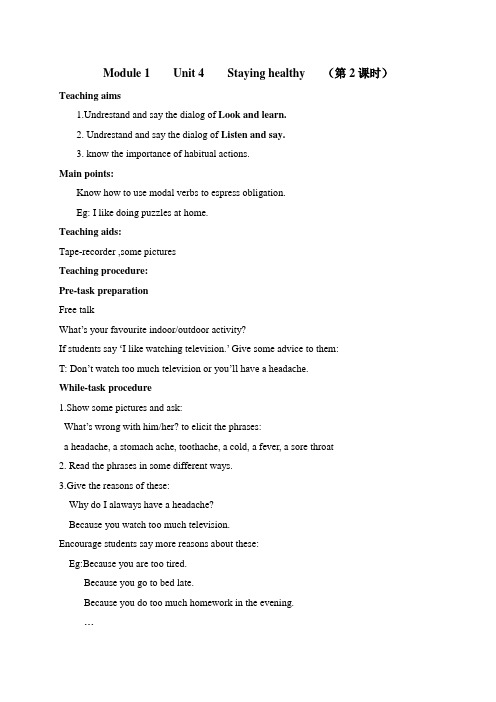
Module 1 Unit 4 Staying healthy (第2课时)Teaching aims1.Undrestand and say the dialog of Look and learn.2. Undrestand and say the dialog of Listen and say.3. know the importance of habitual actions.Main points:Know how to use modal verbs to espress obligation.Eg: I like doing puzzles at home.Teaching aids:Tape-recorder ,some picturesTeaching procedure:Pre-task preparationFree talkWhat’s your favourite indoor/outdoor activity?If students say ‘I like watching television.’ Give some advice to them:T: Don’t watch too much television or you’ll have a headache.While-task procedure1.Show some pictures and ask:What’s wrong with him/her? to elicit the phrases:a headache, a stomach ache, toothache, a cold, a fever, a sore throat2. Read the phrases in some different ways.3.Give the reasons of these:Why do I alaways have a headache?Because you watch too much television.Encourage students say more reasons about these:Eg:Because you are too tired.Because you go to bed late.Because you do too much homework in the evening.…4. Talk about these in groups, Try to say more about the reasonsS1: Why do I always have a headache/ a stomach ache/ a fever/ a cold/ toothache?S2: Because …5.Play the cassette for Listen and say. The students listen and repeat.6. Give the students time to read the dialogues silently.7. Act as the doctors and the patients, make dialogues in groups.(鼓励学生联系生活实际说出生病的原因以及防治的方法。
牛津英语上海版六年级下册知识点整理

牛津英语上海版六年级下册知识点整理Module1 City lifeUnit1 Great cities in Asian词组:the capital of... ...的首都 north-east东北 from...to...从...到...in the past在过去 the Great Wall长城 more than=over超过eat dumpling吃饺子 tall buildings高楼大厦huge department stores大型的百货商店 a lot of许多语法点:1.Beijing is north of Shanghai.北京在上海的北部。
(1)两地不相邻:A is north of B.(2)所属关系:A is in the north of B.(3)两地接壤:A is on the north of B.2.How far is it from Shanghai to Beijing?从北京到上海有多远?How far... 多远。
询问距离的远近,路程的长远。
3.How long does it take to travel from Shanghai to Beijing by train?坐火车从上海到北京要多久?(1)How long...多久。
询问时间长短。
How long…多长。
用于询物的问长度。
(2)by+交通工具,表示“乘...交通工具”,用How提问。
4.It takes about ten hours.大约需要十小时It takes (sb.) st. to do sth. 做某事需要花费多长时间。
5.They enjoy eating dumplings.他们喜欢吃饺子enjoy/like/love doing sth. 喜欢做某事6.Two and a half days=Two days and a half两天半Half an hour=one and a half hours=one/an hour and a half一个半小时Unit2 At the airport词组:plane ticket机票 silk scarf丝巾 a lot of/plenty of大量的,许多departure time出发时间 leave for出发去某地 have to不得不be going to将要 arrive at到达boarding card登机牌 name tap姓名语法点:1.Aunt Judy and Uncle Mike have lived in Los Angeles for six years.朱迪婶婶和迈克叔叔在洛杉矶已住了六年。
(完整版)上海版牛津英语六年级下册6B重点知识点复习整理(最新整理)

(完整版)上海版牛津英语六年级下册6B重点知识点复习整理(最新整理)上海版牛津英语六年级下册6B重点知识点复习整理Module 1 City LifeUnit 1 Great cities in Asia【知识点梳理】1.方位词:east / west / north / south / north-east / north-west / south-east / south-west用法:a. 两地不相邻: e.g. A is north B. (= to the south of)b. 两地接壤: e.g. A is on the north of B.c. 所属关系,A包含B, B属于A: e.g. B is in the north of A.2. by + 交通工具表示“乘……交通工具”, 用how进行提问e.g. by bus / ferry / train / ship / underground… by plane = by air, by ship = by sea3. How far…多远(询问距离的远近,路程的长短)e.g. Hoe far is it from your home to school? 从你家到学校有多远?4. How long…多长,多久(询问时间的长短,提问一段时间)e.g. How long does it take to travel from Shanghai to Beijing by train? 坐火车从上海到北京要花多长时间?5. It takes (sb.) some time to do sth. 做某事需要花费多少时间e.g. It takes me five hours to make this modal plane. 做这个模型飞机花了我5个小时。
6. like / love / enjoy doing sth. 喜欢做某事e.g. The people in Bangkok like / love / enjoy eating spicy food. 曼谷人喜欢吃辛辣食物。
牛津上海版六年级英语下册unit 4 staying healthy 优秀课件

Why do I always have a cold?
PIGGY BANK
GOLD MINE
2-2
It’s because you don’t wear enough clothes, I’m afraid.
What should I do?
12
You should wear more clothes.
3. Alan stayed at home from school because he had a cough and a ______c_o_l_d______.
4. Ben’s head hurt. He has a ____h_e_a_d__a_c_h_e___.
Listen and say
GOLD MINE
Read and write
How did these people feel?
Complete each sentence. 1. Joe’s stomach hurt. He has a __s_t_o_m__a_c_h__a_c_h_e_.
2. Larry didn’t go to the dentist for years. Now he has bad ___t_o_o_t_h_a_c__h_e___.
Read, match and say
Can you give the correct answers?
PIGGY BANK
GOLD MINE
5-1
12345
PIGGY BANK
Why do I always have a stomach ache?
GOLD MINE
5-2
Mr Yang
12345
上海版牛津英语6B(六年级第二学期)单词表(U1-U5带音标)
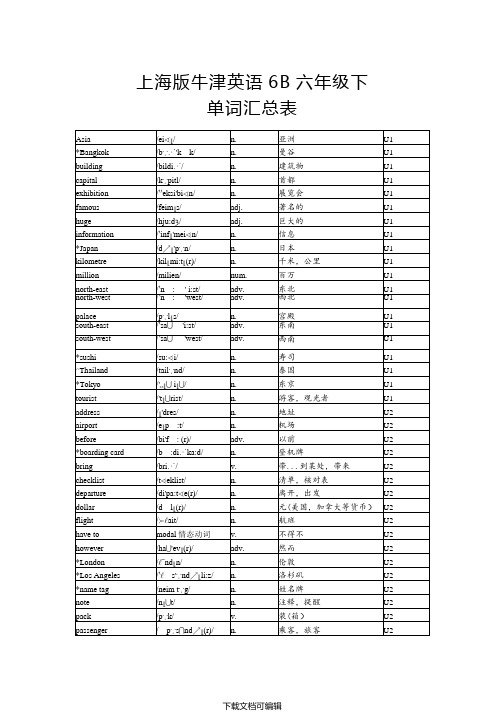
U1
palace
/pls/
n.
宫殿
U1
south-east
/sa'i:st/
adv.
东南
U1
south-west
/sa'west/
adv.
西南
U1
*sushi
/su:i/
n.
寿司
U1
^Thailand
/tailnd/
n.
泰国
U1
*Tokyo
/'i/
n.
东京
U1
tourist
/'trist/
n.
游客,观光者
adj.
可能,能做到(或取得)
U5
possibly
[ˈpɒsəbli]
adj.
(外貌)好看的
U5
grow
[grəʊ]
v.
长大,长高
U5
in front of
在...前面
U5
*kilogram
[ˈkɪləgræm]
n.
千克,公斤
U5
look for
寻找
U5
*magic
[ˈmædʒɪk]
adj.
有魔力的
U5
poor
[pɔ:(r)]
adj.
不擅长的
U5
possible
[ˈpɒsəbl]
n.
洛杉矶
U2
*name tag
/neim tg/
n.
姓名牌
U2
note
/nt/
n.
注释,提醒
U2
pack
/pk/
v.
装(箱)
U2
最新牛津上海版一起六年级下册unit 4《staying healthy》教案1.doc
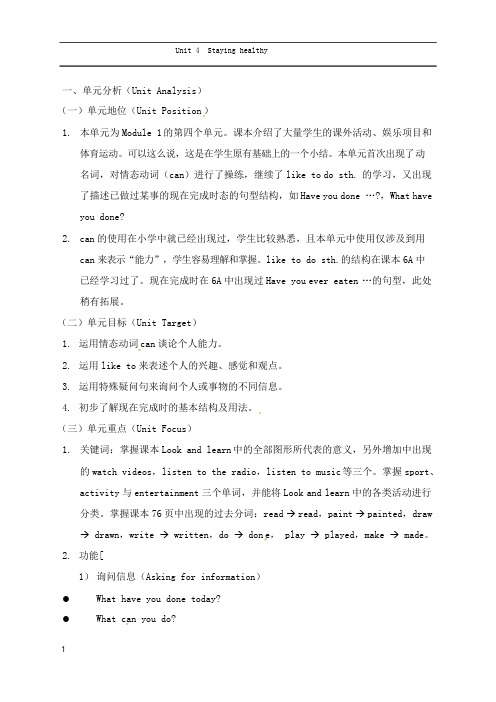
Unit4Staying healthy一、单元分析(Unit Analysis)(一)单元地位(Unit Position)1.本单元为Module1的第四个单元。
课本介绍了大量学生的课外活动、娱乐项目和体育运动。
可以这么说,这是在学生原有基础上的一个小结。
本单元首次出现了动名词,对情态动词(can)进行了操练,继续了like to do sth.的学习,又出现了描述已做过某事的现在完成时态的句型结构,如Have you done…?,What have you done?2.can的使用在小学中就已经出现过,学生比较熟悉,且本单元中使用仅涉及到用can来表示“能力”,学生容易理解和掌握。
like to do sth.的结构在课本6A中已经学习过了。
现在完成时在6A中出现过Have you ever eaten…的句型,此处稍有拓展。
(二)单元目标(Unit Target)1.运用情态动词can谈论个人能力。
2.运用like to来表述个人的兴趣、感觉和观点。
3.运用特殊疑问句来询问个人或事物的不同信息。
4.初步了解现在完成时的基本结构及用法。
(三)单元重点(Unit Focus)1.关键词:掌握课本Look and learn中的全部图形所代表的意义,另外增加中出现的watch videos,listen to the radio,listen to music等三个。
掌握sport、activity与entertainment三个单词,并能将Look and learn中的各类活动进行分类。
掌握课本76页中出现的过去分词:read→read,paint→painted,draw →drawn,write→written,do→don e,play→played,make→made。
2.功能[1)询问信息(Asking for information)●●1What have you done today? What can you do?。
- 1、下载文档前请自行甄别文档内容的完整性,平台不提供额外的编辑、内容补充、找答案等附加服务。
- 2、"仅部分预览"的文档,不可在线预览部分如存在完整性等问题,可反馈申请退款(可完整预览的文档不适用该条件!)。
- 3、如文档侵犯您的权益,请联系客服反馈,我们会尽快为您处理(人工客服工作时间:9:00-18:30)。
Unit 4 Staying healthy(一)知识与技能1熟练掌握特殊疑问句“ Why…?” 和” How often…?”2熟练掌握连词because 的用法。
3巩固like/love/enjoy +doing 结构(二)过程与方法1使用‘wh-‘questions 询问学生所喜欢的活动并由此引出like/love/enjoy +doing 结构e.g. What’s your favourite indoor/outdoor activityI like/love/en joy +swimming/singing/working…2使用‘wh-‘questions询问某事发生的原因,练习对话:Why do I always have a headache?You always have a headache because you watch too much television.3使用‘How’questions 询问事情发生的频率e.g. How often does Danny do some revision4操练句型How often ... ?…once a month. / twice a year.反复操练该句型,使学生熟练掌握。
(三)情感、态度与价值观通过学习课文,学生了解到运动有益健康。
身体的不适和疾病源于不健康的生活习惯。
因此,为了有健康的身体,应有规律地参加适当的室内和室外活动。
Period 1Language focus:Using nouns to identify activitiese.g. singing /dancing/running/swimming /playing/workingUsing the simple present tense to express interestse.g. He likes singing/She enjoys swimming/We love playing.Pre-task preparationLanguage learning activity(This section aims at providing students with opportunities to practise the language/vocabulary needed or become familiar with the background for the task that follows.)1 Play the recording: Sing a song. Students listen first. Then the whole class follows and sings together.2 Divide the students into groups. Ask the students to practise singing and acting the song.3 Groups take turns to sing and act the song in front of the class.4 Ask the students to vote for the best group.Period 2Language focus:Using nouns /noun phrases to identify conditionse.g. a headache/a stomach-ache/toothache/a cold/a fever/a sore throatAsking ‘wh-‘questions to find out the reasone.g. Why do I always have a headacheUsing connectives to give reasonse.g. You always have a headache because you watch too much television.Using adverbs to express degreee.g. too much/too manyPre-task preparation1 Introduce new vocabulary items: a headache, a stomach-ache, toothache, a cold, a fever, a sore throat. Encourage students to use facial expressions and body language to help convey the meanings.2 Play the recording: Look and learn and Think and say. Students listen and follow in their books.3 Play the recording again. Students listen and repeat.4 Invite students to talk about their experience of suffering from a headache, a stomach-ache, toothache, a cold, a fever or a sore throat.While-task procedure1 Students work in groups of five Distribute a copy of photocopiable page 9 to each group. Four members in the group pretend to feel unwell and one member pretends to be Doctor Chen. Ask students to follow the modeled dialogue and work together to complete the dialogue in the other pictures. Tell them to think about different reasons for not feeling well. Then students practise the dialogue in groups.2 Groups take turns to role-play the dialogue in class. Encourage students to use facial expressions and body language and be as dramatic as possible. Write all the reasons for not feeling well on the board to get students familiar with the target language. Finally, vote for the best group.3 Still in groups, ask students to draw and write down different ways for keeping themselves healthy. Collect students’work and put it on the display board.Post-task activityWorkbook page 7ConsolidationGrammar Practice Book 7A page 12Period 3Language focus:Using adjectives to describe activitiese.g. indoor activities/outdoor activitiesUsing nouns to identify activitiese.g. fishing /cycling/swimmingUsing ‘wh-‘questions to find out various kinds of specific information about a persone.g. What’s your favourite indoor/outdoor activityAsking ‘How’questions to find out quantitye.g. How many of my classmates like watching television bestUsing the simple present tense to express opinionse.g….students like …best.Pre-task preparation1 Differentiate between indoor activities and outdoor activities. Write indoor activities and outdoor activities on the board. Read them aloud. Invite the whole class to repeat the words after you. Explain briefly that indoor activities are activities carried on inside a building and outdoor activities are activities carried on outside a building.2 Invite a student to read the list of indoor and outdoor activities in Read and match aloud. Ask a few more able students to think of more indoor and outdoor activities.3 Give students some time to complete Read and match. Check answers orally.4 Students work in pairs to practise the target language in A survey .Invite some pairs of students to role-play the dialogue in class.While-task procedure1 Students work in groups. Distribute a copy of photocopiable page 10 to each group. Ask students to carry out the survey using the target language. Each group completes one survey form. Write down the other groups’findings on the survey form as well. Each group completes a simple report.2 Invite representatives from the groups to come out to the front and read their reports aloud .Collect students’work and put it on the display board.3 Make sure students know how to tead and draw bar chart .4 Students work in groups. Distribute a copy of photocopiable page 11 to each group. Ask students to carry out the survey using the target language. Each group completes one survey form. Write down the other groups’findings on the survey form as well. Each group completes a simple report and draws a bar chart.5 Invite representatives from the groups to come forward and read their reports aloud. Collect students’work and put it on the display board.ConsolidationGrammar Practice Book 7A page 13Period 4Language focus:Asking ‘How’questions to find out frequencye.g. How often does Danny do some revisionUsing the simple present tense to describe habitual actionse.g. He does some revision once a month.Using adverbs to express frequencye.g. once a month/ twice a yearPre-task preparation1 Remind students about the concept of ‘work and play’and review the song on page 14 again2 Invite a more able student to come out to the front and read Danny’s timetable. Other students keep their books closed and listen carefully3 Ask students some questions to check their understanding. Ask: How often does Danny do some revision How often does Danny watch television How often does Danny practise swimming How often does Danny help do the housework to elicit: He does some revision once a month. He watches television three times a day. He practices swimming twice a year. He never helps do the housework.4 Ask students to give their opinion about Danny’s timetable. Write the list of opinions on the board. In conclusion, students should understand that Danny’s timetable is not very good.While-task procedure1 Ask each student to think of and write a good timetable for himself/herself.3 When the students have finished, ask them to work in pairs and compare their timetables with their classmates’timetables by using the target language. One student starts the conversation by asking: How often do you…They take turns to ask and answer questions about the timetables.ConsolidationGrammar Practice Book 7A pages 14 and 16Photocopiable pages 12, 13, 14 and 15NOTES: (单元教后记)1、通过学习本单元课文,学生了解到运动有益健康。
